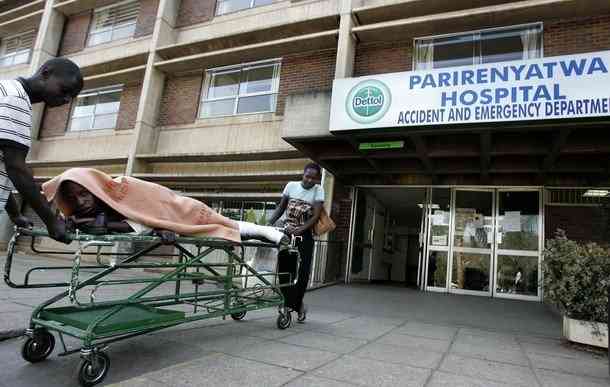
THE public health system continues to face problems that are hindering service delivery. Many people have since lost confidence in the public health system over the poor state of some infrastructure, shortage of essential drugs as well as a demotivated health workforce.
The 2007 World Health Organisation health system framework talks of six building blocks of a strong health delivery system, namely health workforce, financing, governance, information technologies, service delivery and medicines.
Health and Child Care minister Douglas Mombeshora has an insurmountable task to return public health service on track. The minister is a revered public officer, long viewed as a listening someone who dedicates most of his time to duty. Zimbabwe needs ministers of such calibre especially in the health sector where life is a priority.
He should implement reforms which are sustainable, purposeful and include fundamental changes that will have an impact on organisational performance. Zimbabwe trains some of the best medical personnel in the world, but, health service delivery remains very poor. Questions have been asked why the public health system is faltering and the answers are not even complex.
There are many contributory factors to the collapse of the public health system and some of them are incessant corruption, maladministration, inadequate health financing, among other factors. The biggest asset of any organisation is the human resource and failure to satisfy employees on performance management will just spell disaster. Organisational performance becomes plaintive without adequate motivation.
It is not a secret that maladministration plays a significant role in the collapse of the public health delivery system in our country. There is a good number of office-bearers who have been working for some years but yielding nothing. Recruitment and selection should be based on meritocracy and not on nepotism, favouritism or patronage.
The Health ministry has many office-bearers who have been occupying opulent offices for a long time. Their aim is no longer to deliver the best healthcare service but self-aggrandisement. Positions of leadership or management should be occupied by somebody with at least a management qualification.
How can someone run a central hospital without the necessary management qualifications?
- Mr President, you missed the opportunity to be the veritable voice of conscience
- ED to commission new-look border post
- Zanu PF ready for congress
- EU slams Zim over delayed reforms
Keep Reading
Skills and qualification audit should start from the directors at the head office, some of whom have been at the helm of the Health and Child Care ministry since time immemorial. Such people use the rule of thumb and seem blank on strategy formulation and implementation. Do all these directors have the requisite qualifications to be in those demanding offices or it is merely because of favouritism?
We have a whole director of TB and Infectious Diseases but some clinics and hospitals are currently running short of TB drugs? The last time I visited Ruwa Clinic, there were only a few packets of the FDC RHZE, the tablets used for the first two months of the intensive phase of TB treatment. What exactly does such a director do if our citizens are under threat of increased mortality, drug-resistant TB or even multi-drug resistant TB? Our national pharmacy — NatPharm — is another organisation that should live to expectation. Stocks of essential drugs should be readily available.
Central hospitals are not performing as expected. Many of the problems are traced to incompetent management and it does not surprise me that the heads of such hospitals do not have the necessary experience and qualifications.
You hear Chitungwiza Hospital is being headed by a surgeon, Parirenyatwa Group of Hospitals by a gynaecologist, Mpilo Central Hospital by a gynaecologist, Sally Mugabe Central Hospital by a physician. Yes, they may be educated in their own fields but are they qualified to be in management positions? Mombeshora has a huge task on his hands if our public health system is to wake up from its slumber.
President Emmerson Mnangagwa says he wants all of us to achieve Vision 2030 and we all need to support his noble cause. Universal Health Coverage is possible, but do we have the right people who will be the flag carriers for Vision 2030 or we only have opportunists who only want to line their pockets?
Our hard-working minister should not be sabotaged by his subordinates, some of whom have overstayed at Kaguvi Building. A radical revamp of the entire system should be a priority at this juncture!
Johannes Marisa is president of the Medical and Dental Private Practitioners Association of Zimbabwe. He writes here in his personal capacity.







